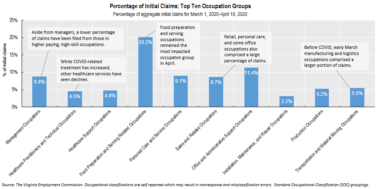Virginia Tech researchers announced Wednesday they have developed in-house COVID-19 testing kits and lab processing services to assist Southwest Virginia health departments with patient testing. Test results can be returned to the health departments as soon as same day.
The initiative is being led by Dr. Michael Friedlander, Tech’s vice president of health sciences and technology and executive director of the Fralin Biomedical Research Institute in Roanoke, with the help of professors, researchers, postdoctoral fellows, lab technicians and graduate students.
Other Virginia universities and health systems, including VCU Health System, U.Va. Health, Sentara Healthcare and Children’s Hospital of the King’s Daughters, have also developed in-house COVID-19 testing capacity.
“We’re going to be able to turn it around, in many cases, the same day we’ll be reporting results back to the health districts, or if not, the next day,” Friedlander said during a virtual news conference Wednesday. “We’re not going to be facing those very long turnaround times you’ve heard about at the state level and national level.”
Tech researchers gained federal and state approvals to process samples at on-campus labs in Blacksburg and Roanoke. University labs were already equipped with much of the necessary equipment needed to manufacture and process tests, Friedlander said, but more will be necessary as testing ramps up. To begin with, Tech will have the capacity to process a couple of hundred samples from local health departments per day and the university it hopes to increase that to 1,000 per day in the next two months or so, Friedlander said.
“Testing has been in short supply from the get-go and [that] created a slow response to the pandemic,” said Dr. Noelle Bissell, director of the New River Health District. Increased turnaround times will help protect medical workers and other first responders from outbreaks, she said. “Having those same-day results really does inform our decision-making and our guidance about staff issues and quarantining.”
Friedlander added, “We need our health care workers on the front lines. We need our first responders.”
To avoid false negative test results, Tech uses an RNA-amplification method for reviewing samples, said Dr. Carla Finkielstein, an associate professor of biological sciences in the College of Science and affiliated faculty member of the Fralin Life Sciences Institute, who helped develop the test. Once a patient sample is delivered to the lab, the sample is amplified, meaning that multiple copies of genetic material — RNA, in this case — are generated to produce a larger sample size.
Viruses make very specific genes only found in these viruses, said Dr. Harald Sontheimer, the director of the Center for Glial Biology in Health, Disease and Cancer at the Fralin Biomedical Research Institute, and executive director of Tech’s School of Neuroscience in the College of Science, who also helped develop the new COVID-19 test. The test seeks four genetic matches for the virus. “That gives us a high level of specificity,” Sontheimer said.
Currently, Virginia Tech has 15 people processing samples. The university estimates it will need approximately 35 to 50 people to process tests as it increases capacity, Friedlander said.
“In the long run, we can’t staff this entirely with Virginia Tech faculty, students and staff,” Friedlander said. Tech is recruiting recent graduates and people with biomedical technician degrees from other universities and community colleges for the testing, he added.
“We’re part of this community. We’re committed to this,” Friedlander said. “And it’s going to make a difference as we do this testing. Virginia Tech is here for the long haul.”

Subscribe to Virginia Business.
Get our daily e-newsletter.



